Emine Ulku Saritas
Vector Modulator Based Active Compensation of Direct Feedthrough in Magnetic Particle Imaging
Feb 13, 2024Abstract:In magnetic particle imaging (MPI), simultaneous excitation and signal acquisition leads to direct feedthrough interference. While this interference can be mitigated up to some extent with passive compensation, its time-varying nature necessitates active compensation methods to achieve the sensitivity levels needed for applications such as stem cell tracking. We have recently proposed an active compensation technique for MRI, which uses a vector modulator and a lookup-table-based algorithm for reducing the direct feedthrough in the analog domain. Here, we adapt this technique to MPI, demonstrating a successful recovery of the fundamental frequency and a significant increase in detection sensitivity.
FD-Net: An Unsupervised Deep Forward-Distortion Model for Susceptibility Artifact Correction in EPI
Mar 18, 2023Abstract:Recent learning-based correction approaches in EPI estimate a displacement field, unwarp the reversed-PE image pair with the estimated field, and average the unwarped pair to yield a corrected image. Unsupervised learning in these unwarping-based methods is commonly attained via a similarity constraint between the unwarped images in reversed-PE directions, neglecting consistency to the acquired EPI images. This work introduces an unsupervised deep-learning method for fast and effective correction of susceptibility artifacts in reversed phase-encode (PE) image pairs acquired with EPI. FD-Net predicts both the susceptibility-induced displacement field and the underlying anatomically-correct image. Unlike previous methods, FD-Net enforces the forward-distortions of the correct image in both PE directions to be consistent with the acquired reversed-PE image pair. FD-Net further leverages a multiresolution architecture to maintain high local and global performance. FD-Net performs competitively with a gold-standard reference method (TOPUP) in image quality, while enabling a leap in computational efficiency. Furthermore, FD-Net outperforms recent unwarping-based methods for unsupervised correction in terms of both image and field quality. The unsupervised FD-Net method introduces a deep forward-distortion approach to enable fast, high-fidelity correction of susceptibility artifacts in EPI by maintaining consistency to measured data. Therefore, it holds great promise for improving the anatomical accuracy of EPI imaging.
DEQ-MPI: A Deep Equilibrium Reconstruction with Learned Consistency for Magnetic Particle Imaging
Dec 26, 2022Abstract:Magnetic particle imaging (MPI) offers unparalleled contrast and resolution for tracing magnetic nanoparticles. A common imaging procedure calibrates a system matrix (SM) that is used to reconstruct data from subsequent scans. The ill-posed reconstruction problem can be solved by simultaneously enforcing data consistency based on the SM and regularizing the solution based on an image prior. Traditional hand-crafted priors cannot capture the complex attributes of MPI images, whereas recent MPI methods based on learned priors can suffer from extensive inference times or limited generalization performance. Here, we introduce a novel physics-driven method for MPI reconstruction based on a deep equilibrium model with learned data consistency (DEQ-MPI). DEQ-MPI reconstructs images by augmenting neural networks into an iterative optimization, as inspired by unrolling methods in deep learning. Yet, conventional unrolling methods are computationally restricted to few iterations resulting in non-convergent solutions, and they use hand-crafted consistency measures that can yield suboptimal capture of the data distribution. DEQ-MPI instead trains an implicit mapping to maximize the quality of a convergent solution, and it incorporates a learned consistency measure to better account for the data distribution. Demonstrations on simulated and experimental data indicate that DEQ-MPI achieves superior image quality and competitive inference time to state-of-the-art MPI reconstruction methods.
Rapid TAURUS for Relaxation-Based Color Magnetic Particle Imaging
Dec 09, 2021


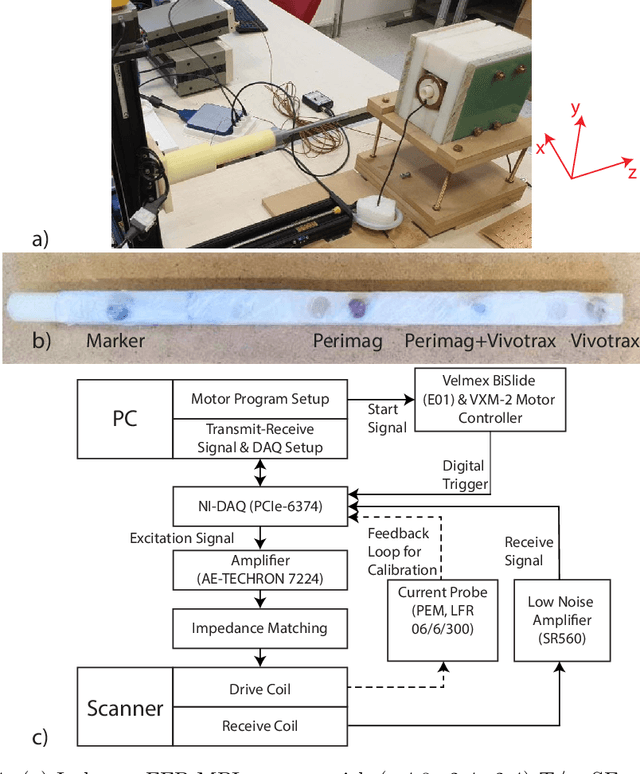
Abstract:Magnetic particle imaging (MPI) is a rapidly developing medical imaging modality that exploits the non-linear response of magnetic nanoparticles (MNPs). Color MPI widens the functionality of MPI, empowering it with the capability to distinguish different MNPs and/or MNP environments. The system function approach for color MPI relies on extensive calibrations that capture the differences in the harmonic responses of the MNPs. An alternative calibration-free x-space-based method called TAURUS estimates a map of the relaxation time constant, by recovering the underlying mirror symmetry in the MPI signal. However, TAURUS requires a back and forth scanning of a given region, restricting its usage to slow trajectories with constant or piecewise constant focus fields (FFs). In this work, we propose a novel technique to increase the performance of TAURUS and enable $\tau$ map estimation for rapid and multi-dimensional trajectories. The proposed technique is based on correcting the mirror symmetry distortion induced by time-varying FFs. We demonstrate via simulations and experiments in our in-house MPI scanner that the proposed method successfully estimates high-fidelity time constant maps for rapid trajectories that provide orders of magnitude reduction in scanning time while preserving the calibration-free property of TAURUS.
Vicinity Effects of Field Free Point on the Relaxation Behavior of MNPs
Nov 30, 2021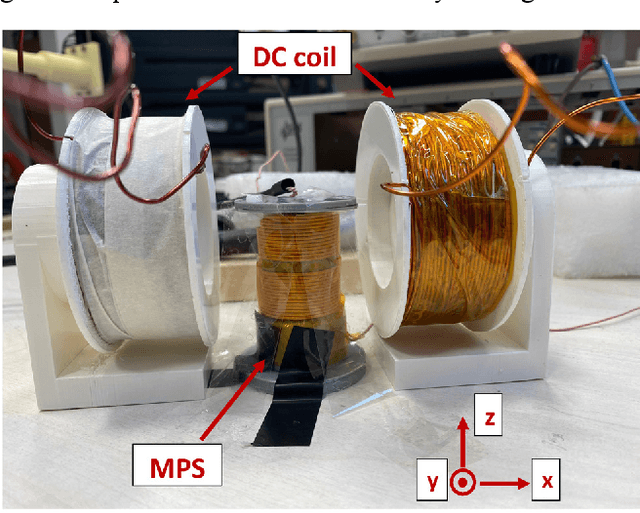

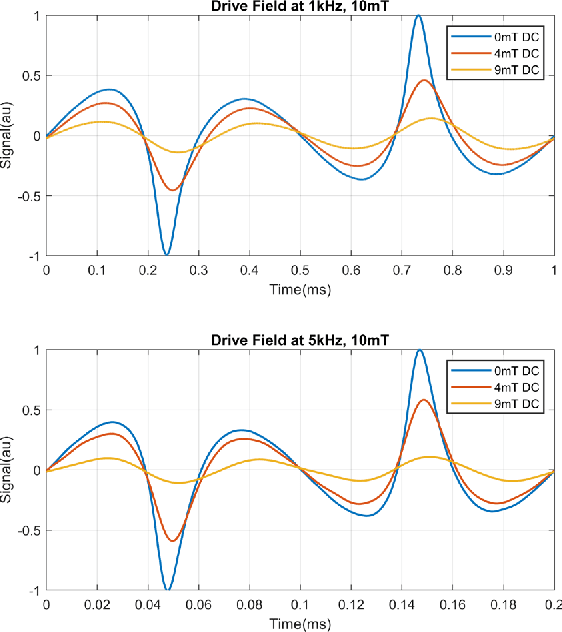
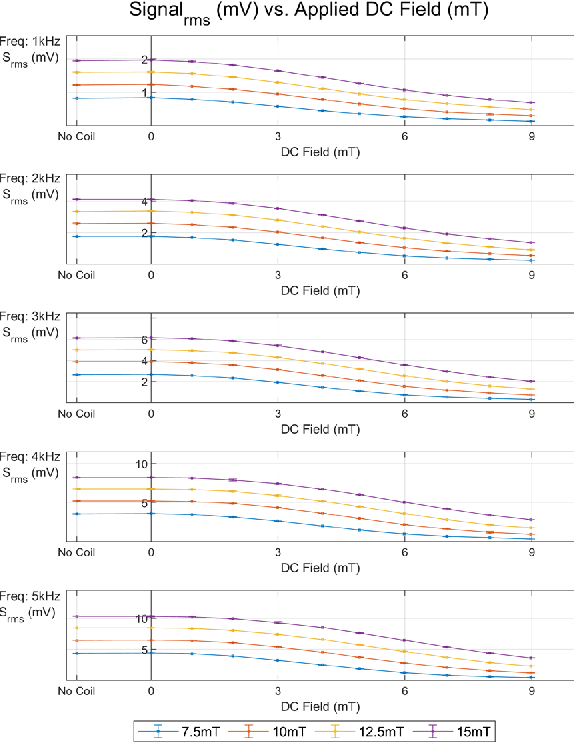
Abstract:In Magnetic Particle Imaging (MPI), the distribution of magnetic nanoparticles (MNPs) is imaged by moving a field free point (FFP) in space. All MNPs in close vicinity of the FFP contribute to the signal induced on the receive coil. The relaxation behavior of these MNPs are subject to a DC field due to the selection field (SF). In this work, we investigate the effects of the DC field on the relaxation behavior of the MNPs, with the goal of understanding the differences between the measured relaxations in Magnetic Particle Spectrometer (MPS) setups vs. MPI scanners.
TranSMS: Transformers for Super-Resolution Calibration in Magnetic Particle Imaging
Nov 03, 2021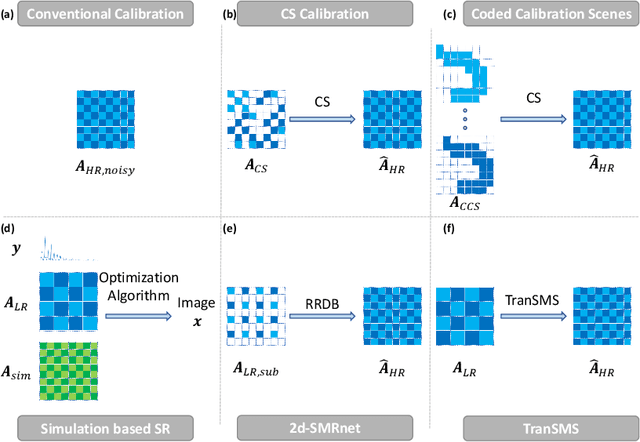
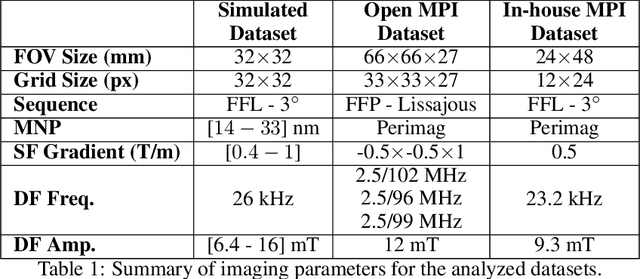
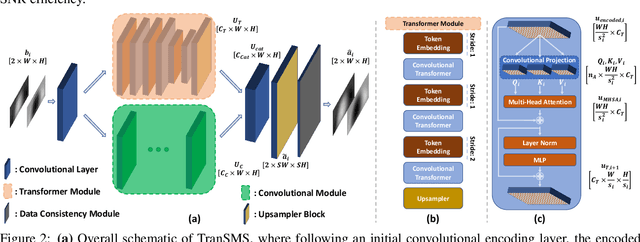

Abstract:Magnetic particle imaging (MPI) is a recent modality that offers exceptional contrast for magnetic nanoparticles (MNP) at high spatio-temporal resolution. A common procedure in MPI starts with a calibration scan to measure the system matrix (SM), which is then used to setup an inverse problem to reconstruct images of the particle distribution during subsequent scans. This calibration enables the reconstruction to sensitively account for various system imperfections. Yet time-consuming SM measurements have to be repeated under notable drifts or changes in system properties. Here, we introduce a novel deep learning approach for accelerated MPI calibration based on transformers for SM super-resolution (TranSMS). Low-resolution SM measurements are performed using large MNP samples for improved signal-to-noise ratio efficiency, and the high-resolution SM is super-resolved via a model-based deep network. TranSMS leverages a vision transformer module to capture contextual relationships in low-resolution input images, a dense convolutional module for localizing high-resolution image features, and a data-consistency module to ensure consistency to measurements. Demonstrations on simulated and experimental data indicate that TranSMS achieves significantly improved SM recovery and image reconstruction in MPI, while enabling acceleration up to 64-fold during two-dimensional calibration.
 Add to Chrome
Add to Chrome Add to Firefox
Add to Firefox Add to Edge
Add to Edge